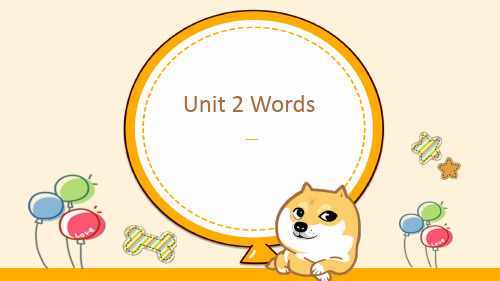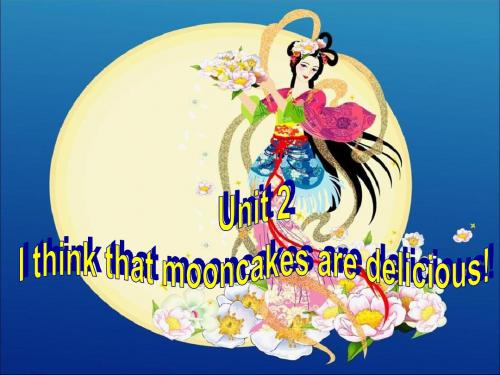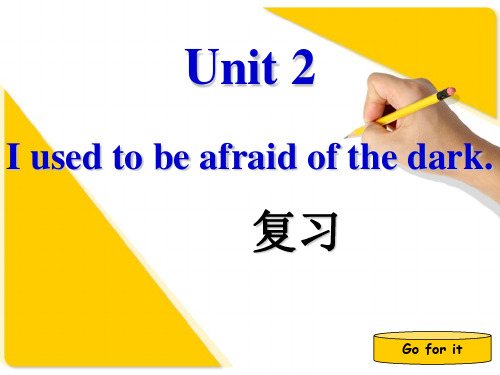人教版九年级英语课文单词知识点精讲第二单元 ppt课件
合集下载
人教版九年级英语Unit2 单词课 课件(共35张)

tie /taɪ/
n. 领带 v. 捆;束
haunted / 'hɔ:ntɪd/
adj. 有鬼魂出没的;闹鬼的
ghost /ɡəʊst/
n. 鬼;鬼魂
trick / trɪk/
n. 花招;把戏
treat / tri:t /
n. 款待;招待v. 招待;请(客)
spider / 'spaɪdə(r)/ n.
adipiscing elit.
mooncake / 'mu:nkeɪk /
n.月饼
lantern / ˈlæntən/
n. 灯笼
stranger / 'streɪndʒə(r)/
n. 陌生人
relative / ˈrelətɪv/
n. 亲属;亲戚
put on
增加(体重);发胖
pound / paʊnd/
Unit 2 Words
section A
Lorem ipsum dolor
Lorem ipsum dolor sit amet, consectetuer adipiscing elit. Aenean commodo ligula eget dolor. Lorem ipsum dolor sit amet, consectetuer
v. 传播;展开 n. 蔓延;传播
lay / leɪ/
v. 放置;安放;产(卵);下(蛋)
laid laid laying
dessert / dɪ'zɜ:t/
n.(饭后)甜点;甜食
garden / 'ɡɑ:dn/
n. 花园;园子
tradition / trəˈdɪʃn / n.
人教版九年级全册unit2 Section A 1a—1c(共16张PPT)

What do you like best about the Chinese Spring Festival?
I love the food, I think that they are delicious.
What do you like best about Water Festiestival in 1a with your partner.
What do you like best about the Dragon Boat Festival?
I love the races. I think that they’re fun to watch.
Remember:
Your parents are an important part of your life, so don’t forget to accompany them!
1. Learn the new words and expressions by heart.
2. Finish the textbook of this class .
Learn some new names about festivals. Talk about what festival you like best.
What festival do you like best?
What do you like best about your favorite
1b Listen and circle T for true or F for false.
1. Bill thinks that the races were not that interesting to watch. T F
人教版九年级英语上册第二单元课件PPT

3. put on 增加(体重);发胖;穿上 e.g. They’ve put on five pounds. 他们体重增加了5磅。 It’s cold outside. Please put on your coat. 外面冷,请穿上大衣。4. pound n. 磅;英镑(可数名词) e.g. The desk weighs 5 pounds. 这张课桌重5磅。
I like…, I think…
1a Match the pictures with the descriptions.
Presentation
1. ___ The Water Festival in Thailand2. ___ The Dragon Boat Festival in Hong Kong3. ___ The Chinese Spring Festival in Beijing4. ___ The Lantern Festival in Jiangxi
The Dragon Boat Festival 端午节
The Water Festival 泼水节
Christmas Day 圣诞节
April Fool’s Day 愚人节
Which festival do you like best? Why?
I like Mid-Autumn Festival, because I think that mooncakes are very delicious!
I like the Dragon Boat Festival, I think the races are so interesting to watch.
n. 陌生人
n. 亲属,亲戚
2b Wu Ming did a lot of fun activities, but there were also downsides. Listen again and fill in the chart.
人教版九年级英语unit2全单元课件

A. used to be
C. is used to be
B. used to being
D. was used to be
2.Don't you remember me?本句为否定疑问句。否定疑问句
表示说话者惊奇、反问、责难或失望等语气,意为“难 道......不......?”。否定疑问句的构成: be动词/助动词/情态动词+not+主语+其他? ---Isn't the boy very clever? ---Yes, he is. ---Yes, I did. / / ---No, he isn't. ---No, I didn't.
辨析:used to do sth., be used to doing sth. 与be used to do sth. used to do sth.“过去常常做某事”,只用于过去时态。 e.g. He used to go to sleep early. be used to doing sth.“习惯于做某事”,可用于现在、过 去、将来等多种时态。 e.g. He is used to going to sleep early. be used to do sth.“被用于做某事”,是被动语态,不定 式表目的,用于多种时态。 e.g. Wood is used to make houses.
11.放弃做某事 give up doing
12.最后,最终 in the end/ at last/ finally
13.作了一个艰难的决定
make a difficult decision
14.送他去一间男孩寄宿学校
send him to a boy’s boarding school
Unit 2 Section A 词汇讲解课件2022-2023学年人教版九年级英语全册

Lay out the map on the table. Let’s have a look. 把地图在桌子上展开,让我们看一看。
lay 与lie的区别
规则变化是说谎(lie-lied-lied); 不规则的位于、躺(lie-lay lain); lay 后跟着俩laid,下蛋、产卵和摆放。
dessert/dɪˈzɜːt/(饭后)甜点,甜食
• ②admire sb. for doing sth.因做某事而钦佩某人 • e.g. I admire the doctor for saving the girl’s life.
我钦佩这位医生,因为他救了那个女孩的命。
tie /taɪ/ n. 领带 v. 捆;束
e.g. He wears a shirt and a tie today. 他今天穿着衬衫,打着领带。 They tied the horse to a tree with a rope. 他们用一根绳子把这匹马拴到树上。
•
and often has a salted egg inside it.
• e . G. Parents make mooncakes, moon masks, and lanterns with
their children. 家长们与他们的孩子们一起制作月饼、月亮形面具和灯笼。
lantern/ˈlæntən/灯笼
• 英文解释:
• sweet food eaten at the end of a meal
• e.g. This dessert can be served straight from the fridge.
•
这种甜食从冰箱里拿出来就可以吃。
tradition n. 传统;惯例
lay 与lie的区别
规则变化是说谎(lie-lied-lied); 不规则的位于、躺(lie-lay lain); lay 后跟着俩laid,下蛋、产卵和摆放。
dessert/dɪˈzɜːt/(饭后)甜点,甜食
• ②admire sb. for doing sth.因做某事而钦佩某人 • e.g. I admire the doctor for saving the girl’s life.
我钦佩这位医生,因为他救了那个女孩的命。
tie /taɪ/ n. 领带 v. 捆;束
e.g. He wears a shirt and a tie today. 他今天穿着衬衫,打着领带。 They tied the horse to a tree with a rope. 他们用一根绳子把这匹马拴到树上。
•
and often has a salted egg inside it.
• e . G. Parents make mooncakes, moon masks, and lanterns with
their children. 家长们与他们的孩子们一起制作月饼、月亮形面具和灯笼。
lantern/ˈlæntən/灯笼
• 英文解释:
• sweet food eaten at the end of a meal
• e.g. This dessert can be served straight from the fridge.
•
这种甜食从冰箱里拿出来就可以吃。
tradition n. 传统;惯例
九年级人教英语课件:Unit 2单元知识归纳(共13张PPT)

1、teacher affects eternity; he can never tell where his influence stops.教师的影响是永恒的;无法估计他的影响会有多深 远。
2、gladly would learn, and gladly teach.勤于学习的人才能乐意施教。
7、is a progressive discovery of our ignorance.教育是一个逐步发现自己无知的过程。2021年11月23日星期二10时14分18秒22: 14:1823 November 2021
8、is a admirable thing, but it is well to remember from time to time that nothing worth knowing can be taught.教育 是令人羡慕的东西,但是要不时地记住:凡是值得知道的,没有一个是能够教会的。下午10时14分18秒下午10时14分22:14:1821.11.
3、is not the filling of a pail but the lighting of a fire.
4、好的nboun than untaught, for ignorance is the root of misfortune与其不受教育,不知不生,因为无知是不幸的根源。
6、does not mean teaching people to kow what they do not know ; it means teachng them to behave as they do not b ehave. 教育不在于使人知其所未知,而在于按其所未行而行。2021年11月下午10时14分21.11.2322:14November 23, 2021
2、gladly would learn, and gladly teach.勤于学习的人才能乐意施教。
7、is a progressive discovery of our ignorance.教育是一个逐步发现自己无知的过程。2021年11月23日星期二10时14分18秒22: 14:1823 November 2021
8、is a admirable thing, but it is well to remember from time to time that nothing worth knowing can be taught.教育 是令人羡慕的东西,但是要不时地记住:凡是值得知道的,没有一个是能够教会的。下午10时14分18秒下午10时14分22:14:1821.11.
3、is not the filling of a pail but the lighting of a fire.
4、好的nboun than untaught, for ignorance is the root of misfortune与其不受教育,不知不生,因为无知是不幸的根源。
6、does not mean teaching people to kow what they do not know ; it means teachng them to behave as they do not b ehave. 教育不在于使人知其所未知,而在于按其所未行而行。2021年11月下午10时14分21.11.2322:14November 23, 2021
(新人教版)英语九年级全册:Unit-2-全单元ppt课件(125页)

__________
4. 飞起; 向上飞
____________up
5. 摆开; 布置
lay__________
6. 回来; 返回
come__________
答案: 1. 呈……的形状 2. 击落 3. 结果 4. fly 5. out
6. back
Ⅲ. 句型填词 1. 一天晚上, 他发现月亮是如此亮和圆以至于他能够看到在那 里的妻子。 One night, he__________ __________ the moon was__________ bright and round__________ he could see his wife there. 2. 泼水节多么有趣啊! __________ fun the Water Festival is! 答案: 1. found that; so; that 2. What
A. 端午节 B. 元宵节 C. 泼水节 D. 春节
Ⅲ. 句型填词 1. ——关于端午节你最喜欢什么? —__________ __________ you__________ __________ about the Dragon Boat Festival? ——我最喜爱竞赛。我认为观看它们很有乐趣。 —I love the races. I think that__________ __________ __________ to watch. 答案: What do; like best; they are fun
Ⅱ. 单项选择
1. —Did you see the film last night?
—Yes, I did. And I think______it’s fun to watch.
人教新目标九年级(新)英语unit 2 知识详解(35张ppt)

He asked they would play basketball after school.
特别强调: If 与whether 的区别(不可替代的情况) whether 1.I don’t know ____________ he will come or not.(与or not 连用只能用whether) whether 2.That depends on ___________he can come back.(介词后只能用whether) whether 3.He wondered _____________to stay here the next week.(后与to do 不定式连用只能用 whether) whether 4.____________he will come is not decided. (句首只能用whether)
Unit 2 知识详解
单元语法聚焦:
w him. 简单句 We know he likes English. 宾语从句 结论:宾语从句就是由一个句子来构成主句的宾语 宾语从句三要素:连接词、语序、时态 连接词: 1).陈述句→that (that 在句中无词义,在从句中 不 能充当句子成分,在口语中往往被省略。) 2).一般疑问句→if/whether(主句 + if / whether + 由一 般疑问句变成的陈述句形式) 3).特殊疑问句→原有的特殊疑问词+句子剩余部分的陈述句形 式 语序:陈述句语序(主句 +连接词 +主语 +谓语 +其他成 分 .) 时态:①当主句是一般现在时,从句用该用的时态(即从句 的时态不受影响) ②当主句是一般过去时态,从句必须用过去的某一时态。
特别强调: If 与whether 的区别(不可替代的情况) whether 1.I don’t know ____________ he will come or not.(与or not 连用只能用whether) whether 2.That depends on ___________he can come back.(介词后只能用whether) whether 3.He wondered _____________to stay here the next week.(后与to do 不定式连用只能用 whether) whether 4.____________he will come is not decided. (句首只能用whether)
Unit 2 知识详解
单元语法聚焦:
w him. 简单句 We know he likes English. 宾语从句 结论:宾语从句就是由一个句子来构成主句的宾语 宾语从句三要素:连接词、语序、时态 连接词: 1).陈述句→that (that 在句中无词义,在从句中 不 能充当句子成分,在口语中往往被省略。) 2).一般疑问句→if/whether(主句 + if / whether + 由一 般疑问句变成的陈述句形式) 3).特殊疑问句→原有的特殊疑问词+句子剩余部分的陈述句形 式 语序:陈述句语序(主句 +连接词 +主语 +谓语 +其他成 分 .) 时态:①当主句是一般现在时,从句用该用的时态(即从句 的时态不受影响) ②当主句是一般过去时态,从句必须用过去的某一时态。
- 1、下载文档前请自行甄别文档内容的完整性,平台不提供额外的编辑、内容补充、找答案等附加服务。
- 2、"仅部分预览"的文档,不可在线预览部分如存在完整性等问题,可反馈申请退款(可完整预览的文档不适用该条件!)。
- 3、如文档侵犯您的权益,请联系客服反馈,我们会尽快为您处理(人工客服工作时间:9:00-18:30)。
stranger n. 陌生人 How can a stranger know who I am?
relative n. 亲属;亲戚 He has neither friends nor relatives.
put on增加(体重);发胖 He's put on pounds in middleage.
garden n. 花园;园子 They have a big house with a garden.
admire v. 欣赏;仰慕 I admire her for her bravery.
tie n. 领带 v. 捆;束 That tie goes with your shirt.
He tied his shoes by himself.
treat n. 款待;招待 v. 招待;请(客) I treat them with respect.
spider n. 蜘蛛 I’m afraid of the spiders.
Christmas n. 圣诞节 What do you usually have for Christmas dinner?
end up 最终成为;最后处于 At first they hated each other, but they ended up getting married.
present n. 现在;礼物 adj. 现在的 He gave her a beautiful present. He was worried about the present trouble.
eve n. (尤指宗教节假日的)前夕;前夜 With all the family together, we had a nice New Year Eve.
dead adj. 死的;失去生命的 His cat has been dead for a week.
His cat died a week ago. His cat’s death makes him sad.
U2:I Think that Mooncakes Are delicious!
词汇
mooncake n. 月饼 Chinese people eat mooncakes on the Mid-Autumn Festival.
lantern n.灯笼 There is an ice lantern show in Harbin every year in winter.
lay v. 放置,安放;产(卵),下(蛋) Dinosaurs laid eggs like birds do.
lay out 摆开;布置 Here we lay out all the best ideas.
dessert n. (饭后)甜点;甜食 I’d like to share my dessert
fool n. 蠢人;傻瓜 v. 愚弄 adj. 愚蠢的 You cannot fool me anymore.
lie v. 平躺;处于;撒谎 I like to lie on the sunny beach, basking in the sunshine.
novel n. (长篇)小说 Of all his novels I like this one best.
haunted adj. 有鬼魂出没的;闹鬼的 Memories of the old days haunted him.
ghost n. 鬼魂 What is the scariest ghost story you know?
trick n. 花招;把戏 How did she look through his trick?
business n. 生意;商业 His parents wanted him to go into business.
punish v. 处罚惩罚 The teacher may punish you for what you did.
warn v. 警告;告诫 I warned him not to climb the tree.
put away 收起 Why don’t you put away your books?
后置定语 定语修饰名词,一般放在名词前。(前置定语) a brave girl 形容词词组作定语,一般放在名词后。(后置定语) a girl brave enough to fight for her rights 分词词组作后置定语,-ing现在分词(主动)-ed过去分词(被 动) Who is the man standing there?
goddess n. 女神 He adored her as a goddess.
whoever pron. 无论谁;不管什么人 You may select whoever you think is suitable.
steal v. 偷;窃取 He stole a loaf of bread from the kitchen.
put on 穿戴;增加(体重);上演 He put on my cpounds now. They put on a show last night.
put off 推迟 He put off the meeting for no reason.
warmth n. 温暖;暖和 They went out to enjoy the warmth of the sun.
知识点
what & how引导感叹句 What+ n.(+主谓)! How+adj./adv.(+主谓)! What an interesting book it is! What interesting books they are! How interesting the book is! How fast he runs!
remind sb. of sth. “使某人想起某事;提醒某人做某事” He reminded me of my brother. remind sb. to do sth. “提醒某人去做某事” I remind him to wash the car.
relative n. 亲属;亲戚 He has neither friends nor relatives.
put on增加(体重);发胖 He's put on pounds in middleage.
garden n. 花园;园子 They have a big house with a garden.
admire v. 欣赏;仰慕 I admire her for her bravery.
tie n. 领带 v. 捆;束 That tie goes with your shirt.
He tied his shoes by himself.
treat n. 款待;招待 v. 招待;请(客) I treat them with respect.
spider n. 蜘蛛 I’m afraid of the spiders.
Christmas n. 圣诞节 What do you usually have for Christmas dinner?
end up 最终成为;最后处于 At first they hated each other, but they ended up getting married.
present n. 现在;礼物 adj. 现在的 He gave her a beautiful present. He was worried about the present trouble.
eve n. (尤指宗教节假日的)前夕;前夜 With all the family together, we had a nice New Year Eve.
dead adj. 死的;失去生命的 His cat has been dead for a week.
His cat died a week ago. His cat’s death makes him sad.
U2:I Think that Mooncakes Are delicious!
词汇
mooncake n. 月饼 Chinese people eat mooncakes on the Mid-Autumn Festival.
lantern n.灯笼 There is an ice lantern show in Harbin every year in winter.
lay v. 放置,安放;产(卵),下(蛋) Dinosaurs laid eggs like birds do.
lay out 摆开;布置 Here we lay out all the best ideas.
dessert n. (饭后)甜点;甜食 I’d like to share my dessert
fool n. 蠢人;傻瓜 v. 愚弄 adj. 愚蠢的 You cannot fool me anymore.
lie v. 平躺;处于;撒谎 I like to lie on the sunny beach, basking in the sunshine.
novel n. (长篇)小说 Of all his novels I like this one best.
haunted adj. 有鬼魂出没的;闹鬼的 Memories of the old days haunted him.
ghost n. 鬼魂 What is the scariest ghost story you know?
trick n. 花招;把戏 How did she look through his trick?
business n. 生意;商业 His parents wanted him to go into business.
punish v. 处罚惩罚 The teacher may punish you for what you did.
warn v. 警告;告诫 I warned him not to climb the tree.
put away 收起 Why don’t you put away your books?
后置定语 定语修饰名词,一般放在名词前。(前置定语) a brave girl 形容词词组作定语,一般放在名词后。(后置定语) a girl brave enough to fight for her rights 分词词组作后置定语,-ing现在分词(主动)-ed过去分词(被 动) Who is the man standing there?
goddess n. 女神 He adored her as a goddess.
whoever pron. 无论谁;不管什么人 You may select whoever you think is suitable.
steal v. 偷;窃取 He stole a loaf of bread from the kitchen.
put on 穿戴;增加(体重);上演 He put on my cpounds now. They put on a show last night.
put off 推迟 He put off the meeting for no reason.
warmth n. 温暖;暖和 They went out to enjoy the warmth of the sun.
知识点
what & how引导感叹句 What+ n.(+主谓)! How+adj./adv.(+主谓)! What an interesting book it is! What interesting books they are! How interesting the book is! How fast he runs!
remind sb. of sth. “使某人想起某事;提醒某人做某事” He reminded me of my brother. remind sb. to do sth. “提醒某人去做某事” I remind him to wash the car.
